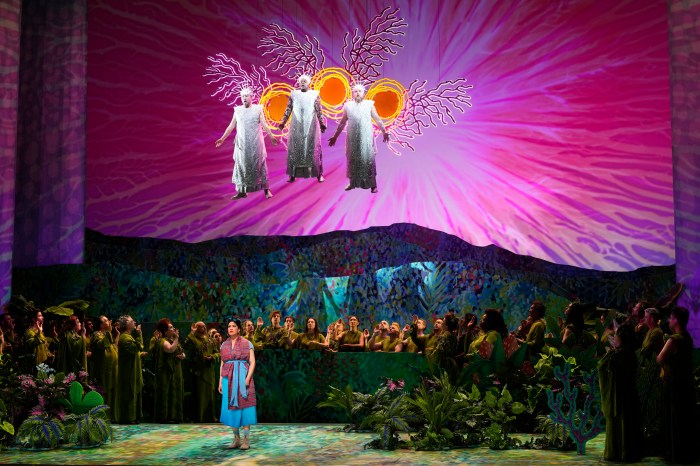Directed by: Wes Anderson
Starring: Ralph Fiennes, Tony Revolori, Saoirse Ronan, Adrien Brody, Jeff Goldblum
Rated: R
Playing at: Regal Union Square, Lincoln Square
Wes Anderson is one of the few American filmmakers who has such a distinct style that he could be simultaneously parodied on “Saturday Night Live” and acclaimed as a leading voice in a movement to reclaim and reassert the value of artifice as content on the big screen.
Movies these days often opt for realism or total fantasy. The terrains basically don’t mix. The art of transforming meticulously composed, design-heavy universes into resonant worlds has been largely relegated to Anderson, Terry Gilliam and a few contemporaries.
A movie like “The Grand Budapest Hotel” offers the perfect reminder of just how effective Anderson’s technique can be when it comes to utilizing a superficial exterior to reach an affecting emotional place.
On one level, it’ s a brightly colored farce about a hotel concierge named Gustave H (Ralph Fiennes), who finds himself falsely accused of murder in a fictional Eastern European setting in 1932. There’s an odd cast of characters, including a lobby boy (Tony Revolori), a lawyer (Jeff Goldblum), a young woman sporting an enormous birthmark (Saoirse Ronan) and an angry heir (Adrien Brody) and his mostly silent knuckles-cracking henchman (Willem Dafoe).
The movie has whimsical snow-swept chase scenes and quirky digressions, slapstick humor and verbal volleys, period-chic outfits, saturated pinks and reds and performances pitched at a rapid clip. It features Anderson staples such as ample narration, miniatures, Bill Murray and Owen Wilson, all assembled with the meticulousness of a filmmaker bestowed with the gift of incorporating precise detail into a coherent continental European vision.
But to perseverate on the classical Hollywood pop-up storybook aesthetic is to downplay what makes “The Grand Budapest Hotel” so special.
Fiennes’ performance, the best and most unique work of his distinguished career, imbues the refined and superficially sunny Gustave with a morose heart suggesting an abiding knowledge that his way of life will soon be permanently erased. There’s a palpable loneliness wedged in the silences between his soliloquies and rhapsodies.
The movie is framed with scenes set in the crumbling titular hotel circa 1968, which is a shell of what it was at its bustling peak. It’s populated by castoffs and lonely souls, its gargantuan ballroom left mostly empty and its brightly-colored lobby rendered obsolete.
Anderson packs the livelier ’30s scenes with hints of the chaos to come in the form of a Second World War, as menacing soldiers loom outside the window of a speeding train and Nazi-like forces eventually seize control of the Grand Budapest.
Slyly, beneath its punchy exterior, “The Grand Budapest Hotel” serves as Anderson’s elegy to a world wiped away by the chaos and destruction of the war and the ennui and sadness of the reconstruction. It’s a time capsule, really, showing us the twilight of a man and his era, subverting rosy nostalgic currents to memorialize life’s fleeting shadow.

















